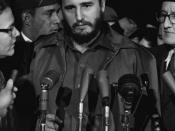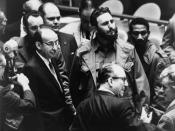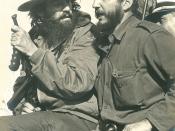One could find hundreds of books concerning the Russian revolution; however, it was George Orwell's Animal Farm that shed light on the corruption of the revolution. Even though Animal farm is clearly a satire on the Russian Revolution, it can easily be compared to many revolutions, especially the Cuban. Both revolutions were led by a powerful man, or animal, with strong public support, and spoke of a great nation in which everyone was equal. Yet, in the end of both revolutions, the supreme leader ended up being corrupt and a full-fledged dictator. Orwell wanted to show how there is such corruption only in mankind, hence Animal Farm being a novel with talking animals; acting as an emphasis on the fact that animals would never conduct a situation of any similarity.
The most significant detail that Orwell included in his book was Napoleon, a powerful and forceful leader who felt he was always just, clearly portraying a dictator.
Such a character could easily be compared to Fidel Castro, the leader of the Russian revolution. For, as soon as Castro took office in Cuba, he listened to no one, and did only as he saw fit. As Castro led the revolution, he gained the love of the majority of Cuba because most Cubans at the time were either poor or middle class; and Castro spoke about equality amongst everyone, meaning there would be no rich or poor. However, once Castro gained the people's trust he put fear in everyone's eyes with examples of torture, arbitrary imprisonment, unfair trials, and extra-judicial executions. Much like Castro, Napoleon started out by acting as a compassionate leader, and in concern of the animals' "well-being". He then put fear in the animals' eyes by releasing Jessie's nine puppies, the enormous, fierce dogs that Napoleon had trained as...


